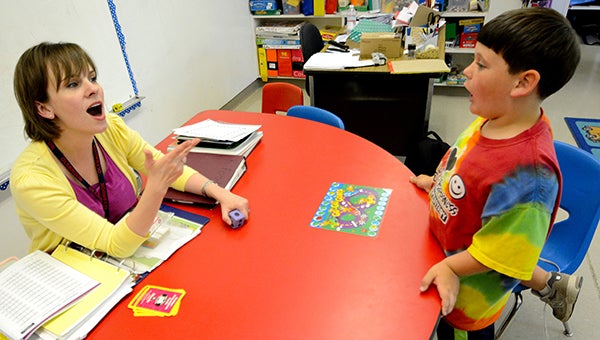Opening Communication: Speech pathologist aids local children
Published 11:53 am Wednesday, May 21, 2014

DAILY LEADER / KATIE WILLIAMSON / Rachel Powell plays Chipper Chat, a phonological awareness game with Peyton Stokes, a kindergartener at Mamie Martin Elementary School Monday. The game helps children break down words into sounds, which is a pre-reading skill.
From birth, humans have the ability to communicate. Babies may smile at their mothers, get excited when fathers talk, or cry, a lot, at various sounds. They may not be understood, but it is evident they are communicating. But, if a baby does not respond to others’ attempts to communicate, it could be an early sign of a language disorder.
“Communication is essential to the quality of life. Too many people don’t recognize early problems with communication,” said Rachel Powell, president of the Mississippi Speech-Language-Hearing Association and speech-language pathologist for Mamie Martin Elementary School. “More than likely you know someone who is affected by a communication disorder.”
According to the American Speech-Language-Hearing Association, five percent of children have noticeable speech disorders. Six to eight million people in the United States have some type of language impairment. This can affect their ability to talk, understand, read or write. For children the signs can be seen as early as infancy.
Trending
“I see the benefits of early intervention every day,” said Powell. “Unfortunately, I also see the consequences of parents’ and others’ waiting too long to seek treatment, which is why the “Identify the Signs” campaign is so important.”
The campaign is a national effort of the ASHA, which encourages parents to educate themselves about communication disorders. The earlier a child is recognized as having a problem, the more successful treatment will be.
Powell works with 37 preschool through second grade students at Mamie Martin. She is one of six speech-language pathologists in the Brookhaven School District who help students with language problems in a variety of ways such as breaking down words in to sounds for children to annunciate or working on grammar, vocabulary and story-telling skills.
“While it’s certainly never too late to seek help, treatment is most successful, less expensive and takes the shortest amount of time when a parent or loved one is able to pick up on the earliest signs of these disorders,” said Powell.
Parents should watch for the following signs in their child:
• Does not interact socially
Trending
• Does not follow or understand what others say
• Says only a few sounds or words or makes only a few gestures
• Says words that are not easily understood
• Does not combine words
• Struggles to say sounds or words.
“One should not assume a child will ‘outgrow’ speech or language difficulties,” said Powell. “There is never harm in seeking an assessment, whether it results in putting a parent’s mind at ease or identifying a potential issue in a child that can be treated.”
Last year, the Mississippi State Legislature passed a bill that requires all public school children to be screened by school speech pathologists for speech, language, voice and fluency disorders before the end of first grade. If a student fails the screening, parents are notified and with their consent the school can test students and possibly begin speech-language therapy. Screening, testing and therapy are free.
Parents can request that students be screened in school or preschool. Before the age of three, children can be tested at no cost through the Mississippi State Department of Health Early Intervention Program. In Brookhaven parents can receive these services at King’s Daughter Therapy and Fitness Center, the Brookhaven School District or the Lincoln County School District.




